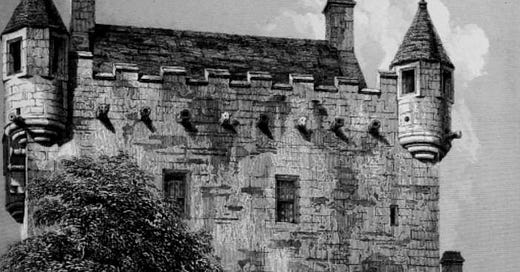Our featured Word of the Week is candle, and that puts me in mind of a quiet scene in Macbeth — but it’s a quiet that comes before a storm. Before I set the scene, I’d like to make a point about how the great ones in the old days composed their poetry. And it wasn’t just poetry; I’m sure that some of our friends here might be able to show us how composers like Bach did the same sort of thing, and lovers of art and architecture could show us what the master sculptors and glazers were doing at Chartres Cathedral, and how Michelangelo organized his paintings on the Sistine Chapel ceiling. You have to think in a way that makes everything in a work of art present to you simultaneously, so that each moment reflects upon the others in a constellation of ways. It’s as if Bach could show the whole of an oratorio present in one of its small measures, or, to go in the other direction, as if Michelangelo could say that if you really want to understand that small space between God’s finger and Adam’s, you have to look to the Final Judgment. Anyway, to read Shakespeare well, you have to remind yourself that he does nothing by accident, and that if he uses what looks like a striking word in one place — a word like candle, when there are in fact no candles nearby — you should remember it when he uses it again, and say, “I see!” Or at least, “I think I’m starting to see.”
So here is the scene. The worthy and loyal knight, Banquo, is keeping watch outside of Macbeth’s castle, while King Duncan of Scotland, his sons, and various lords are within, including of course Mr. and Mrs. Macbeth. Banquo is with his son, Fleance, portrayed here as a boy. Among the many things I notice that sets Shakespeare apart from his contemporaries of the stage is that children play a very large role in his works, and that he never allows cruelty to a child to go unpunished; as if he always kept in mind the words of Christ, that the only way to enter the kingdom of God is as a little child. And woe to the man who offends the least of these, he said — better for him to be cast into the sea with a great millstone around his neck. So father and son are there in the night, and they talk a little bit about what time it is, and how the skies are looking. But it’s clear that some of the wariness caused by the recent civil war in Scotland has not been dispersed, and Banquo himself has troubled thoughts. We will learn that he is suspicious of his noble friend, Macbeth. When somebody suddenly enters in on their conversation, Banquo draws his sword and demands to know who is there. “A friend,” says Macbeth. A friend — indeed.
It’s ironic, because this same Macbeth, after he has murdered King Duncan to grab the throne, hires assassins to deal with Banquo and Fleance. They kill the father, but the son flees. That’s a thorn in Macbeth’s side, because the same witches who foretold that he would be king also foretold that Banquo would beget a race of kings — to culminate, by the way, in King James I of England, the Scotsman before whom Shakespeare and his company, then called The King’s Men, first staged the play. But back to the word, candle. Banquo’s comment on the sky above is gently whimsical, though a little ominous. He says, basically, that heaven is being frugal, because their candles are all out. What that means, of course, is that the sky is overcast, so you can’t see the stars. But we will meet that word candle again, much later in the play, after Macbeth’s long series of murders has turned almost all Scotland against him. It’s as he prepares for his final battle, when he hears of the queen’s death. “Out, out, brief candle,” he says. His view of life by now is meager and disaffected and weary. Life doesn’t last longer than it takes a little candle to burn down. Nor does it mean anything, not according to Macbeth, the childless and friendless. It’s a poor player, meaning a lousy actor, strutting and fretting on the stage for an hour, then to be heard no more. It’s a tale “told by an idiot, full of sound and fury, / Signifying nothing.”
And what should we expect a man to say, once he has delivered his soul up to ambition and wickedness? But he is wrong, and there are many moments in the play that point us in the direction of goodness and light, against the malevolent witches, the unnatural Lady Macbeth, and this self-tormented self-contradiction of humanity, Macbeth. The little scene between Banquo and Fleance is one of them. Maybe Macbeth should have looked a little more often at those eternal candles in the sky.
BANQUO. How goes the night, boy? FLEANCE. The moon is down; I have not heard the clock. BANQUO. And she goes down at twelve. FLEANCE. I take it, ’tis later, sir. BANQUO. Hold, take my sword.—There’s husbandry in heaven; Their candles are all out. Take thee that too. A heavy summons lies like lead upon me, And yet I would not sleep. Merciful powers, Restrain in me the cursed thoughts that nature Gives way to in repose! Enter Macbeth and a Servant with a torch. Give me my sword.—Who’s there? MACBETH. A friend.
Listen to this episode with a 7-day free trial
Subscribe to Word & Song by Anthony Esolen to listen to this post and get 7 days of free access to the full post archives.














